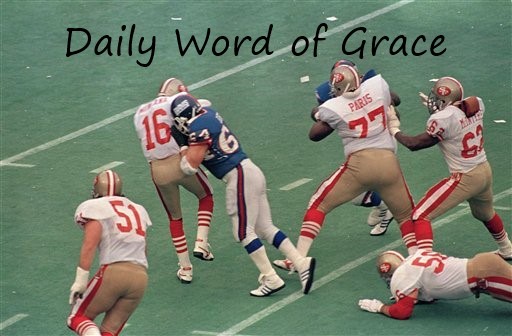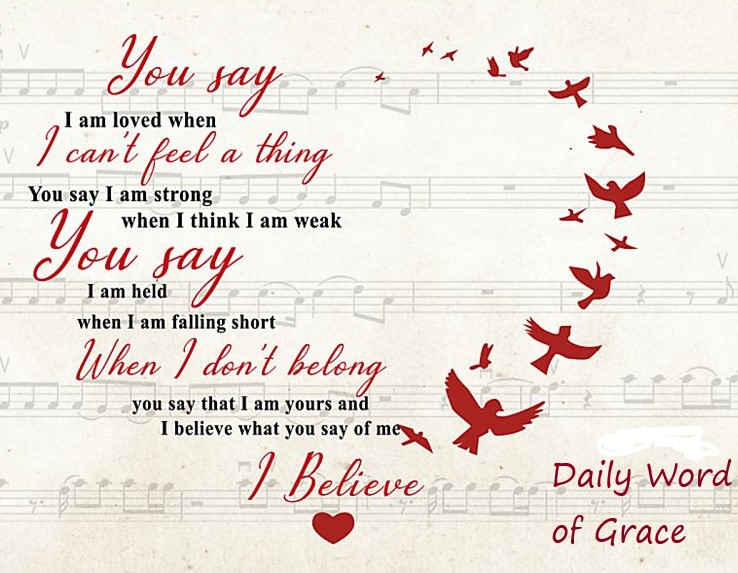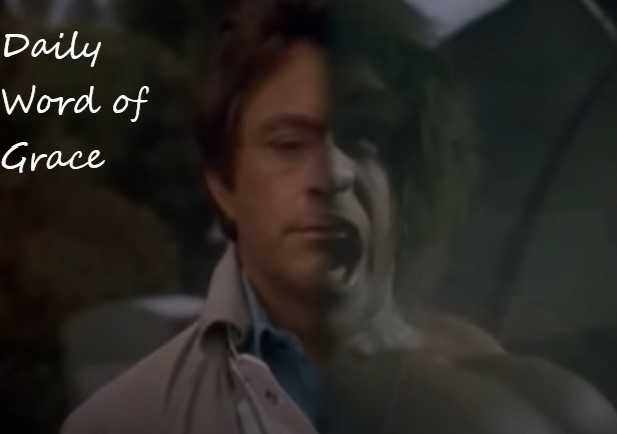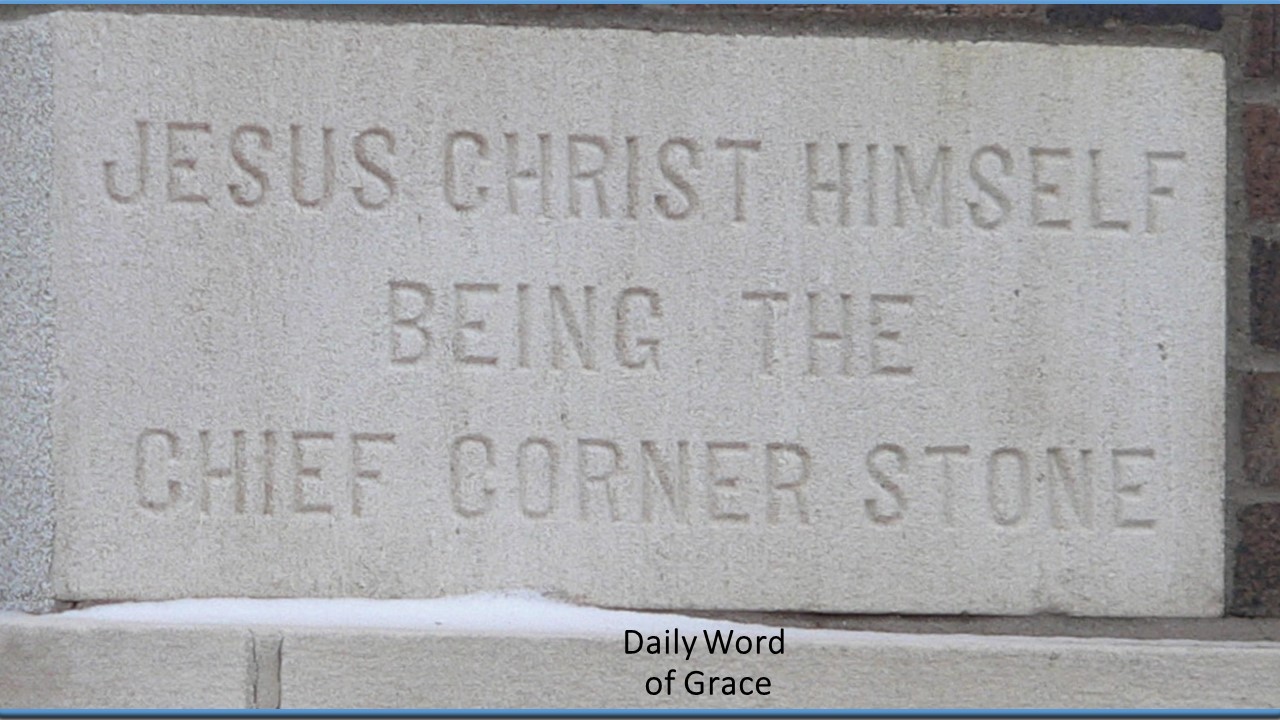Daily Word of Grace June 2020. Current postings of Daily Word of Grace can be found at the upper level of the page. Here is a link to see the current postings.
One of Jesus’s teachings about the Holy Spirit is darkly funny at the outset: “Is there anyone among you who, if your child asks for a fish, will give a snake instead of a fish? Or if the child asks for an egg, will give a scorpion?” (Luke 11:11-12). Giving a hungry child a snake instead of a fish or a scorpion instead of an egg is about as dark as it gets, and yet sometimes we are tempted to think that when we ask God for good things God will give us harmful things instead. But the exact opposite is true, as Jesus continues, “If you then, who are evil, know how to give good gifts to your children, how much more will the heavenly Father give the Holy Spirit to those who ask him!” (Luke 11:13). I love Jesus’ candor here—“If you then, who are evil”—for indeed we are all evil sinners in need of God’s grace. And yet if we ask, God will give us the grace of the Holy Spirit, the very presence of the living God to assure us in our hearts that we are God’s beloved children who can cry out to our Heavenly Father, “Abba! Father!” (Romans 8:15). “Abba” is the Aramaic word for “Daddy” (as well as the name of the best band Sweden ever produced) an intimate term of affection and trust that was often one of the first words spoken by a toddler. Along these lines, a short helpful prayer that I have prayed countless times is “Lord, please cleanse me from my sins and fill me with your Spirit”—a prayer of intimate affection and trust that is a direct response to Jesus’ word to ask our Heavenly Abba, for the Holy Spirit.
Love and Prayers,
Dave


Although Led Zeppelin is not known for their love songs as much as their iconic rock classics, one of my favorite of their songs is “Thank You” from Led Zeppelin II (1969), a beautiful song about the steadfastness of love. Robert Plant sings: “If the sun refused to shine I would still be loving you. When mountains crumble to the sea there will still be you and me. Kind woman, I give you my all.” The love of God for you is just like that, which means as the psalmist wrote, “Therefore we will not fear, though the earth should change, though the mountains shake in the heart of the seas; though its waters roar and foam, though the mountains tremble, with its tumult” (Psalm 46:2-3). Sometimes the trembling of the mountains actually is a sign of the presence of the God, as when Moses and the Israelites met with God “the mountain shook violently” (Exodus 19:18)—and as the prophet Isaiah put it, “When you did awesome deeds that we did not expect, you came down, the mountains quaked at your presence” (Isaiah 64:3). All of this points to Good Friday when God did something else “we did not expect” in giving his Son Jesus to die on the cross to atone for our sins on a different mountain, Calvary, where he gave us his all. And after Jesus died “the sun refused to shine” and that mountain shook too (Matthew 27:51). And at Jesus’ Second Coming when the comic shaking of the mountains is over, God will still be loving you. In the meantime, God’s words to you remain “There will still be you and me.”
Love and Prayers,
Dave
One of the greatest quarterbacks in NFL history is the legendary Joe Montana, who led the San Francisco 49’ers to four Super Bowl titles. In addition to his prolific statistics and his ability to come through in the clutch again and again, Joe also had the respect of his teammates because of something else, his humility. In his 2015 biography, Montana, Keith Dunnavant describes what Joe Montana would do: “Whenever some defensive player charged through the line and slammed him to the ground, Montana was not the sort of quarterback who returned to the huddle breathing fire, demanding accountability. Usually, in such situations, he would say, ‘My fault. I held the ball too long.’ Even when it wasn’t, and he hadn’t. In these moments, his teammates found the sort of strength that built confidence and the kind of humility that promoted loyalty” (206). Sometimes when we make mistakes in our lives, when we metaphorically miss a block, we expect God to return to the huddle “breathing fire, demanding accountability.” But the good news of the gospel is that Jesus humbled himself to the point of being a servant, humbled himself in being “slammed to the ground” and nailed to a cross, and humbled himself in dying an ignominious death (Philippians 2:6-8). Even though scripture is clear that he never sinned, Jesus still took the blame upon himself “so that in him we might become the righteousness of God” (2 Corinthians 5:21). And by the power of the Holy Spirit Jesus’ humility can promote loyalty within us toward God.
Love and Prayers,
Dave


On his final album, Double Fantasy (1980), John Lennon has a lullaby entitled “Beautiful Boy (Darling Boy)” that he wrote for his son Sean: “Close your eyes, have no fear. The monster’s gone, he’s on the run and your daddy’s here. Beautiful, beautiful, beautiful, beautiful boy. Before you go to sleep, say a little prayer. Every day in every way it’s getting better and better. Beautiful, beautiful, beautiful, beautiful boy…Before you cross the street, take my hand. Life is what happens to you while you’re busy making other plans. Beautiful, beautiful, beautiful, beautiful boy.” Little did John Lennon know when he wrote this that he would be shot outside his apartment building in New York City on December 8, 1980—and that his son Sean would spend the rest of his earthly life without his earthly father. In a rooftop conversation one night Jesus told a Pharisee named Nicodemus, “God so loved the world that he gave his only Son, so that everyone who believes in him may not perish but may have eternal life” (John 3:16). In other words, God loves you so much he gave his “beautiful, beautiful, beautiful, beautiful boy” in order to save you from your sin and give you eternal life. This means John’s words to Sean are God’s words to you, “Close your eyes, have no fear. The monster’s gone, he’s on the run and your daddy’s here”—and regardless of what you encounter in your life that happens to you “while you’re busy making other plans” God’s plan for your salvation will indeed be accomplished.
Love and Prayers,
Dave
In his riveting 1997 book The Perfect Storm Sebastian Junger recounts the tragic story of the Andrea Gail a commercial fishing vessel lost during “the perfect storm” in the North Atlantic during the fall of 1991. Near the end of the book he observes, “Anyone who has been through a severe storm at sea has, to one degree of another, almost died, and that fact will continue to alter them long after the winds have stopped blowing and the waves have died down. Like a war or a great fire, the effects of a storm go rippling outward through webs of people for years, even generations. It breaches lives like coastlines and nothing is ever again the same” (219-220). You can probably recount some kind of “severe storm” you have endured in your life (or are enduring right now). The good news of the gospel is that Jesus is with you even in the most severe storms. When the disciples were caught in a severe storm in the middle of the night Jesus walked on the water all the way to them and after saving Peter, personally “got into the boat” and when he did so, “the wind ceased” (Matthew 14:22-32). On Good Friday Jesus endured the “perfect storm” of his passion and death, and did not almost die, actually did die. And the Risen Jesus still bears the scars of that perfect storm, because following a severe storm or perfect storm indeed “nothing is ever again the same.” And because of Jesus’ death for you, in an eternally positive way, nothing will ever again be the same for you, for the Lord will bring you safely through every perfect storm in your life, and your death, until you find yourself in God’s presence in heaven, “the wind ceased” forever.
Love and Prayers,
Dave


One of the often overlooked attributes of Jesus is his gentleness. Perhaps this is because we live in a world in which gentleness is often absent, in which gentleness is deemed less important than being assertive. And yet gentleness mattered a lot to Jesus, as he preached, “Take my yoke upon you, and learn from me; for I am gentle” (Matthew 11:29). The Old Testament prophet Isaiah described the coming Messiah as being a gentle shepherd: “He will feed his flock like a shepherd; he will gather the lambs in his arms, and carry them in his bosom, and gently lead the mother sheep” (Isaiah 40:11). Gentleness marks the life of one who is led by the Holy Spirit (Galatians 5:23). During his earthly ministry Jesus treated with gentleness those who were not used to be treated gently—lepers, tax collectors, prostitutes, criminals. In his passion and death Jesus was even gentle with those who false accused him of blasphemy, as he kept his silence; Jesus was even gentle with the soldiers who struck him on the face as he turned the other cheek; Jesus was even gentle to those who nailed him to the cross and prayed on their behalf, “Father, forgive them; for they do not know what they are doing” (Luke 23:34). Moreover, the Risen Jesus treated his disciples with gentleness, proclaiming to them repeatedly, “Peace be with you” (John 20:19, 21, 26). And the Risen Jesus treats all of us with gentleness, and in response as we read in scripture, “Let your gentleness be known to everyone” (Philippians 4:5).
Love and Prayers,
Dave
In the Old Testament the Lord commanded Moses to instruct the priests to proclaim the following blessing over Israel: “The Lord bless you and keep you; the Lord make his face to shine upon you, and be gracious to you; the Lord lift up his countenance upon you, and give you peace” (Numbers 6:24-26). This blessing is beautiful and full of high octane gospel. To be blessed by the Lord means to receive God’s favor, God’s grace—grace that keeps you and grace that means God’s face shines on you—or in other words, that God smiles on you. To be blessed by the Lord means that the Lord is indeed gracious towards you, not angry or wrathful or judgmental. To be blessed by the Lord means the Lord lifts up his countenance upon you, that the Lord is for you, not against you. To be blessed by the Lord means peace, that when it comes to your relationship with God you have peace, not confusion or turmoil or anxiety. This blessing foreshadows Jesus’ death on Good Friday. In his death on the cross to atone for the sins of the world Jesus blessed you, kept you, made his face shine upon you, and was gracious to you. In being lifted upon the cross Jesus lifted his countenance upon you and drew the whole world to himself (John 12:32), and gave you peace with God (Romans 5:1). And Jesus remains your “Great High Priest” to whom you can go anytime to receive “grace to help in time of need” (Hebrews 4:14-16), to receive yet again the blessing of God.
Love and Prayers,
Dave


In her moving 2018 song “You Say” contemporary Christian singer Lauren Daigle describes something with which all of us struggle: “I keep fighting voices in my mind that say I’m not enough, every single lie that tells me I will never measure up. Am I more than the sum of every high and low?” Then she prays, “Remind me once again just who I am, because I need to know” and continues in the chorus, “You say I am loved when I can’t feel a thing. You say I am strong when I think I am weak. And You say I am held when I am falling short, and when I don’t belong, You say I am Yours. And I believe, oh I believe, what You say of me, I believe.” Years of pastoral ministry, and just plain years of life, have shown me Lauren Daigle is not alone, not at all. Many people feel like they are not enough, or feel like they will never measure up (or both)—perhaps even you. And yet the song does not stop there (thankfully), but continues with a prayer for a reminder of who we actually are in Jesus Christ. And that prayer is answered in the most beautiful (and biblical way) because in Jesus Christ you are indeed loved even when you can’t feel a thing (John 3:16), you are indeed strong when you think you are weak (2 Corinthians 12:9-10), you are indeed held in God’s victorious hands even when you are falling short (Isaiah 41:10), and when you don’t belong you are indeed God’s (1 Peter 2:9) because you were bought with the precious blood of Jesus Christ on Good Friday (1 Peter 1:18-19). It is not the voices in your mind—what you say about yourself and what others say about you—that carry the day, but rather what God says about you that carries the day, today and every day.
Love and Prayers,
Dave
One of my favorite writers is the acclaimed Southern Gothic master Flannery O’Connor (1925-1964) from Milledgeville, Georgia, where she lived at Andalusia Farm the last twelve years of her life. Several years ago I visited Andalusia Farm, and you can still see much of her furniture and belongings, including the desk at which she wrote and the crutches she needed her final years as her battle with lupus (a battle that ultimately proved too strong for her) intensified. Her stories are often dark, and on the surface can seem fatalistic or nihilistic, but beneath the surface is the theme of grace for her many characters who were seriously flawed in one way or another, like all of us. In a letter dated April 4, 1958 she wrote, “Part of the difficulty of all this is that you write for an audience who doesn’t know what grace is and don’t recognize it when they see it. All my stories are about the action of grace on a character who is not very willing to support it, but most people think of these stories as hard, hopeless, brutal, etc.” (O’Connor: Collected Works 1067). Sometimes each of us, like O’Connor’s audience, “doesn’t know what grace is and don’t recognize it when they see it.” Scripture tells us that in Jesus Christ the Son of God “we have all received grace upon grace” (John 1:16), grace that we may not understand or recognize, but grace nonetheless. God’s grace, God’s one-way unconditional love, remains true and steadfast regardless of our ability to understand or recognize it, regardless of the serious flaws in our lives, regardless of the ailments in our lives for which we too in one way or another need crutches. God’s grace softens our heart when it is hard, gives us hope when we are hopeless, and is gentle in a world that is often brutal—and when it comes to our salvation, God’s grace will eventually prove to be the central theme in our lives.
Love and Prayers,
Dave


As a kid I loved the 1970’s CBS classic TV show The Incredible Hulk, starring Bill Bixby as Dr. David Banner, who under extreme stress would be transformed into the Incredible Hulk, played by Lou Ferrigno. My friends and I had the opening narration memorized, “Dr. David Banner—physician, scientist—searching for a way to tap into the hidden strengths that all humans have. Then an accidental overdose of gamma radiation alters his body chemistry. And now, when David Banner grows angry or outraged, a startling metamorphosis occurs. The creature is driven by rage…‘Don’t make me angry—you wouldn’t like me when I’m angry.’” Unfortunately in these times of extreme stress we have been reminded that like David Banner, many of us also have a “raging sprit that dwells within”—and also like David Banner, many of us become absolutely unlikable when we are angry. The same dynamic can be seen in the Apostle Paul, who described himself as prior to his conversion being “a blasphemer, a persecutor, and a man of violence”…and yet something happened that changed him: “But I received mercy because I had acted ignorantly in unbelief and the grace of our Lord overflowed for me with the faith and love that are in Christ Jesus” (1 Timothy 1:13-14). Moreover, God offers you this same mercy and grace given the apostle, as Paul continues, “The saying is sure and worthy of full acceptance, that Christ Jesus came into the world to save sinners—of whom I am the foremost” (1 Timothy 1:15). This is what happened on Good Friday when Jesus, under extreme stress we could never imagine, responded not in rage or anger, but in love. And through the power of the Holy Spirit God’s love can bring about “a startling metamorphosis” of a different kind, a good kind, in all of us.
Love and Prayers,
Dave


One of the many amazing songs on Carole King’s 1971 masterpiece album Tapestry (which won the Grammy for Album of the Year) is a high octane gospel song for those in need of a friend, a song that won the Grammy for Song of the Year): “When you’re down and troubled, and you need some love and care, and nothing, nothing is going right, close your eyes and think of me and soon I will be there to brighten up even your darkest night. You just call out my name and you know wherever I am I’ll come running, to see you again. Winter, spring, summer, or fall, all you have to do is call, and I’ll be there. You’ve got a friend.” Who among us cannot relate to that? All of us have times when we are “down and troubled,” times when we “need some love and care,” times when it seems “nothing is going right.” And yet, that is exactly when Jesus, the Light of the World (John 8:12) is there “to brighten up even your darkest night.” Scripture assures us that “everyone who calls on the Name of the Lord shall be saved” (Acts 2:21). This is true all year round, no matter the external season of “winter, spring, summer, or fall”, no matter the internal seasons in our hearts and minds. No matter what, Jesus will be there “to the end of the age” (Matthew 28:20). No matter what, in Jesus “you’ve got a friend” (Matthew 12:19).
Love and Prayers,
Dave
In his moving 1997 memoir Tuesdays with Morrie Mitch Albom recounts the conversations he had with Morrie Schwartz, his beloved sociology professor from Brandeis University. As Morrie was dying of ALS, every Tuesday morning Mitch would fly from Michigan to Massachusetts, spend the afternoon with Morrie at the nursing home, then fly back to Michigan that night. In one conversation Morrie spoke with Mitch about an often overlooked aspect of forgiveness: “It’s not just other people we need to forgive, Mitch,” he finally whispered. “We also need to forgive ourselves.” “Ourselves?” “Yes. For all things we didn’t do. All the things we should have done. You can’t get stuck on the regrets of what should have happened. That doesn’t help you when you get to where I am… Forgive yourself. Forgive others. Don’t wait, Mitch. Not everyone gets the time I’m getting. Not everyone is as lucky” (166-167). In many years of pastoral ministry, and yes my own life too, I have encountered countless instances of people withholding forgiveness from themselves, beating themselves up repeatedly for mistakes of the past. On Good Friday Jesus died for the forgiveness of all our sins (Ephesians 1:7)—all of them, every single one of them—even those for which we have not forgiven ourselves. Scripture is crystal clear that in response God calls us to forgive others just as we have already been forgiven by God (Ephesians 4:32; Colossians 3:13)—and it is okay to include ourselves in that. This is of the utmost importance, because not forgiving ourselves often hinders our ability to forgive others, so Morrie was exactly right when he told Mitch, “Don’t wait.”
Love and Prayers,
Dave


One of the Old Testament prophecies of Zechariah includes this gem, “Not by might, nor by power, but by my spirit, says the Lord of hosts” (Zechariah 4:6). There are areas or circumstances or challenges in each of our lives that defy any “might” or “power” we may try to use to fix them. Even the Apostle Paul was not immune to this, as he revealed in his Second Letter to the Corinthians: “A thorn was given me in the flesh” (2 Corinthians 12:7). Paul did not identify exactly what this “thorn in the flesh” was, but it obviously defied any efforts of his own might or power to fix it, and yet when he asked God to take away that “thorn in the flesh” he received a reply from God that he did not anticipate: “Three times I appealed to the Lord about this, that it would leave me, but he said to me, ‘My grace is sufficient for you, for power is made perfect in weakness’” (2 Corinthians 12:8-9). What is the “thorn in the flesh” in your life? What is your weakness that has defied every effort of might or power on your part to fix it? That is exactly where the God’s grace is sufficient for you, exactly where God’s words to Zechariah are God’s words to you, “Not by might, nor by power, but by my spirit.” Paul then shows us the relief found in this truth: “So, I will boast all the more gladly of my weaknesses, so that the power of Christ may dwell with me” (2 Corinthians 12:9).
Love and Prayers,
Dave
In the 2017 film Star Wars: Episode VIII—The Last Jedi, Yoda reminds Luke Skywalker of something he already knew but had forgotten (something all of us know but tend to forget), “Failure is the greatest teacher”—or in Yoda-speak, “The greatest teacher failure is.” I wish this were not true, I really do, but I can look back on my life and see again and again that many of the greatest lessons I have learned have been from my failures (and trust me, there have been plenty of those). Many years ago when I was a candidate for ordination, the Commission on Ministry asked me a question I never anticipated (and the only question I remember their asking me), “What is one of the greatest failures in your life and how did you experience God’s grace in that?” What an unnerving yet profound question, because when it comes to the actual grace of God connecting with our actual lives, Yoda is exactly right, “The greatest teacher failure is.” This is because the greatest Teacher in the midst of our failures is the One whose death atones for all our failures, the One who continues to love us unconditionally in spite of and in the midst of our failures, the One whose “surpassing grace” is always more than enough (2 Corinthians 9:14). It is through God’s grace experienced in our failures that we learn the true nature of God’s love and compassion, and are reminded of the opportunity God gives us to share that love and compassion with those around us.
Love and Prayers,
Dave


In John Steinbeck’s brilliant 1952 novel East of Eden, he poignantly describes the ongoing effects of the deep wound of childhood rejection: “The greatest terror a child can have is that he is not loved, and rejection is the hell he fears. I think everyone in the world to a large or small extent has felt rejection. And with rejection comes anger, and with anger some kind of crime in revenge for the rejection, and with the crime guilt—and there is the story of mankind” (Penguin Classics edition 270). Every one of us has experienced rejection in our life—perhaps right now someone who rejected you comes to your mind—and unfortunately, if we’re honest, each one of us has also rejected someone else. This rejection is deeply wounding, and as Steinbeck observed, is often directly connected with acting out in anger. The good news of the gospel is that although you have been rejected by others, and have rejected others yourself, God has never rejected you. In fact, scripture tells us Jesus was rejected in our place, that in his incarnation and earthly ministry and ultimately his passion and death, “He came to what was his own, and his own people did not accept him” (John 1:11), that Jesus the Messiah was indeed “despised and rejected by others” (Isaiah 53:3). In his death and resurrection has atoned for all the rejection in the world, and in your life, and even now, especially in the areas of anger in your heart due to rejection, offers you healing acceptance and grace, offers you perfect love that casts out fear (1 John 4:18), even the fear of rejection.
Love and Prayers,
Dave
I will never forget the first time I heard U2’s hit “New Year’s Day” (from their album War) on the radio in early 1983 when I was in 8th grade. I was mesmerized, and little did I know I would be a U2 fan for the next several decades (and counting). In the chorus Bono ominously sings, “Nothing changes on New Year’s Day.” The recent outbreak of rioting throughout our country is a stark reminder of the unchanging nature of racism and anger—and the centuries-long deep seeded hurt and injustice beneath it. It hearkens back to the 1960’s and demonstrates that indeed “Nothing changes on New Year’s Day.” And yet, on this same album U2 also has a song of hope entitled “Drowning Man” for those overwhelmed by our troubled world in which Bono cries out, “Take my hand, you know I’ll be there, if you can. I’ll cross the sky for your love, for I have promised, oh, to be with you tonight and for the time that will come. And I understand these winds and tides, this change of times won’t drag you away. Hold on, and hold on tightly. Hold on, and don’t let go of my love. The storms will pass, it won’t be long now. His love will last, His love will last forever.” God assures us through the Old Testament prophet Isaiah, “Do not fear, for I have redeemed you; I have called you by name, you are mine. When you pass through the waters, I will be with you; and through the rivers, they shall not overwhelm you” (Isaiah 43:1-2). And in his incarnation Jesus literally did “cross the sky your love”, and on Good Friday suffered a violent death at the hands of an angry world. While our angry and broken human condition does not change on New Year’s Day, neither does God’s unconditional love in Jesus Christ.
Love and Prayers,
Dave


One of my favorite sections in The Book of Common Prayer is “Prayers and Thanksgivings”, a veritable treasure trove. Among these beautiful prayers is this one “For the Mission of the Church”: “Everliving God, whose will it is that all should come to you through your Son Jesus Christ: Inspire our witness to him, that all may know the power of his forgiveness and the hope of his resurrection; who lives and reigns with you and the Holy Spirit, one God, now and forever. Amen” (816-817). This brief but theologically loaded prayer reminds us that God’s heart is for “all” (not just some) to come to God through Jesus Christ—that “God our Savior…desires everyone to be saved and to come to the knowledge of the truth” (1 Timothy 2:4). And the heart of this salvation, the heart of this truth is indeed the power of God’s forgiveness and the hope of Christ’s resurrection—which together ensure that yes, you are forgiven and yes, you do have eternal life—both solely through the grace of God in Jesus Christ. Jesus’ shed blood atones for your sin and means you are forgiven—“in him we have redemption through his blood, the forgiveness of our trespasses according the riches of his grace” (Ephesians 1:7). Jesus’ resurrection means death is not the end of your story, for you too will be raised from the dead—“he who raised Christ from the dead will give life to your mortal bodies also” (Romans 8:11). Now, and especially at the end of your life, you need to be reminded that you are forgiven and that you are going to heaven—and that powerful prayer does just that.
Love and Prayers,
Dave
I love riding trains. As a boy I took my first train ride from Washington, D.C. to Harper’s Ferry, West Virginia and loved watching the scenery change outside the window, and that has never changed. In 1965, in the midst of the Civil Rights movement, the late Curtis Mayfield wrote his most famous song, “People Get Ready” for The Impressions. This song resonated during the Civil Rights era and continues to resonate even now: “People get ready, there’s a train a comin’. You don’t need no baggage, you just get on board. All you need is faith, to hear the diesels hummin’. Don’t need no ticket, you just thank the Lord.” That train can represent so many different things—love, hope, a second chance, a better tomorrow—and connects with the desire within all of us for all those things, and more. This train also describes the gospel of God’s unconditional love in Jesus Christ, a train for which you indeed need no baggage because God offers to carry your baggage for you (Matthew 11:28), a train for which you indeed need no ticket because you have been bought by “the precious blood of Jesus Christ” (1 Peter 1:19), a train for which indeed “all you need is faith” (Ephesians 2:8), a train for which the only response is indeed to “thank the Lord.” As the song continues we learn that this train is for all of us, no exceptions: “So people get ready for the train to Jordan, picking up passengers coast to coast. Faith is the key, open the doors and board ‘em. There’s hope for all among those loved the most”…and of course, “among those loved the most” includes you. Yes, as you ride this train the scenery outside the window is always changing, but God’s love never does.
Love and Prayers,
Dave


In what is believed to be Shakespeare’s first published work, his narrative poem Venus and Adonis (1593) he incisively describes the troubled nature of human love. After Venus discovers the dead body of her beloved Adonis, she pronounces her curse on human love: “Since thou art dead, lo! here I prophesy, sorrow on love hereafter shall attend: it shall be waited on with jealousy, find sweet beginning, but unsavory end; ne’er settled equally, but high or low, that all love’s pleasure shall not match his woe. It shall be fickle, false, and full of fraud.” The Old Testament prophet Jeremiah similarly describes the human heart, “The heart is devious above all else; it is perverse—who can understand it?” (Jeremiah 17:9).—and Jesus follows suit but turns the heat up even further, “Out of the heart come evil intentions, murder, adultery, fornication, theft, false witness, slander” (Matthew 15:19). No wonder scripture urges us to pray, “Create in me a clean heart, O God” (Psalm 51:10). While each of us have been burned at one time or another by human hearts “fickle, false, and full of fraud” (even if that describes our own heart) God’s love remains unchanging, true, genuine, and unending. At the Last Supper Jesus said, “No one has greater love than this, to lay down one’s life for one’s friends” (John 15:13) and did exactly that for you the very next day. And in spite of the troubled nature of human love, as we read repeatedly (twenty-six times in fact) in Psalm 136, God’s “steadfast love endures forever.”
Love and Prayers,
Dave
Several summers ago I had the privilege of visiting Tuscumbia, Alabama and touring the childhood home of one of my heroes, Helen Keller (1880-1968), the brilliant lady who through the untiring work of her teacher Anne Sullivan overcame being stricken with blindness and deafness as a nineteen-month old toddler. Helen went on to graduate from college, author several books, and be awarded the Presidential Medal of Freedom. She inspired millions of people as she addressed issues of human rights and peace. At her childhood home is the actual well where Anne Sullivan taught Helen her first word, “water” which she learned as Anne gently held her hands under the running water from the well. In order to help compensate for her loss of sight and hearing, Helen’s sense of touch was extremely acute, and as she recounts in her 1903 autobiography The Story of My Life, “The hands of those I meet are dumbly eloquent to me. The touch of some hands is an impertinence. I have met people so empty of joy, that when I clasped their frosty finger tips, it seemed as if I were shaking hands with a northeast storm. Others there are whose hands have sunbeams in them, so that their grasp warms my heart” (100). In Jesus Christ God became Anne Sullivan to a world of Helen Keller’s, and touched a blind and deaf world with hands teeming with sunbeams of grace, hands that hold ours under the running water of life (John 4:14)—hands that warm our heart and remind us in our darkness and silence that we are still loved unconditionally by the Creator and Redeemer of the world.
Love and Prayers,
Dave


Daily Word of Grace # 55 (June 1, 2020)
The Old Testament Book of Psalms includes a section called “Psalms of Assent” (120 through 134). These psalms were recited and sung by the Israelites as they ascended the road to Jerusalem for annual feasts such as Passover. These brief and theologically loaded psalms include these perspective adjusting words: “Unless the Lord builds the house, those who build it labor in vain. Unless the Lord guards the city, the guard keeps watch in vain. It is in vain that you rise up early and go late to rest, eating the bread of anxious toil; for he gives sleep to his beloved” (Psalm 127:1-2). The builder of the house is the Lord, not you. After Peter correctly identified Jesus as “the Messiah, the Son of the living God” Jesus assured him, “On this rock I will build my church” (Matthew 16:16, 18). The builder of the church is the Lord, not you. In these times of continued anxiety and stress, when the foundations of houses and churches are being shaken, it is a relief to remember who the Builder actually is. Jesus and his disciples likely recited and sung Psalm 127 during their final ascent to Jerusalem before Jesus’ passion and death as the Passover “Lamb of God who takes away the sin of the world” (John 1:29). In his passion, death, and resurrection Jesus indeed built the house, built the church “with Christ Jesus himself as the cornerstone” (Ephesians 2:20). This is a relief for those losing sleep over the building of the house and church, and replaces “the bread of anxious toil” with the Bread of Life (John 6:35).
Love and Prayers,
Dave